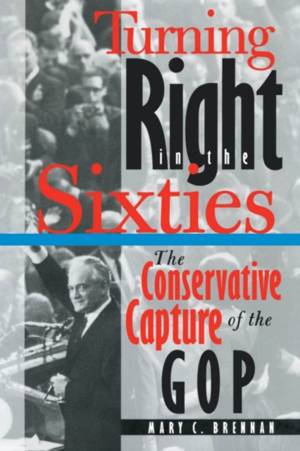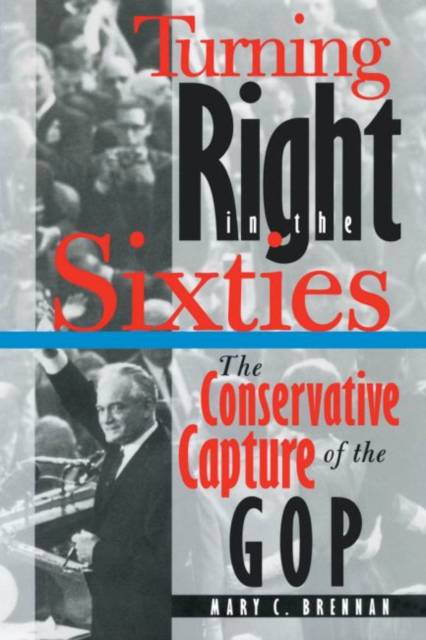
Door een staking bij bpost kan je online bestelling op dit moment iets langer onderweg zijn dan voorzien. Dringend iets nodig? Onze winkels ontvangen jou met open armen!
- Afhalen na 1 uur in een winkel met voorraad
- Gratis thuislevering in België vanaf € 30
- Ruim aanbod met 7 miljoen producten
Door een staking bij bpost kan je online bestelling op dit moment iets langer onderweg zijn dan voorzien. Dringend iets nodig? Onze winkels ontvangen jou met open armen!
- Afhalen na 1 uur in een winkel met voorraad
- Gratis thuislevering in België vanaf € 30
- Ruim aanbod met 7 miljoen producten
Zoeken
€ 64,95
+ 129 punten
Omschrijving
Ideologically divided and disorganized in 1960, the conservative wing of the Republican Party appeared to many to be virtually obsolete. However, over the course of that decade, the Right reinvented itself and gained control of the party. In Turning Right in the Sixties, Mary Brennan describes how conservative Americans from a variety of backgrounds, feeling disfranchised and ignored, joined forces to make their voices heard and by 1968 had gained enough power within the party to play the decisive role in determining the presidential nominee.
Building on Barry Goldwater's short-lived bid for the presidential nomination in 1960, Republican conservatives forged new coalitions, began to organize at the grassroots level, and gained enough support to guarantee Goldwater the nomination in 1964. Brennan argues that Goldwater's loss to Lyndon Johnson in the general election has obscured the more significant fact that conservatives had wrested control of the Republican Party from the moderates who had dominated it for years. The lessons conservatives learned in that campaign, she says, aided them in 1968 and laid the groundwork for Ronald Reagan's presidential victory in 1980.
Building on Barry Goldwater's short-lived bid for the presidential nomination in 1960, Republican conservatives forged new coalitions, began to organize at the grassroots level, and gained enough support to guarantee Goldwater the nomination in 1964. Brennan argues that Goldwater's loss to Lyndon Johnson in the general election has obscured the more significant fact that conservatives had wrested control of the Republican Party from the moderates who had dominated it for years. The lessons conservatives learned in that campaign, she says, aided them in 1968 and laid the groundwork for Ronald Reagan's presidential victory in 1980.
Specificaties
Betrokkenen
- Auteur(s):
- Uitgeverij:
Inhoud
- Aantal bladzijden:
- 224
- Taal:
- Engels
Eigenschappen
- Productcode (EAN):
- 9780807858646
- Verschijningsdatum:
- 16/03/2007
- Uitvoering:
- Paperback
- Formaat:
- Trade paperback (VS)
- Afmetingen:
- 152 mm x 229 mm
- Gewicht:
- 335 g

Alleen bij Standaard Boekhandel
+ 129 punten op je klantenkaart van Standaard Boekhandel
Beoordelingen
We publiceren alleen reviews die voldoen aan de voorwaarden voor reviews. Bekijk onze voorwaarden voor reviews.











